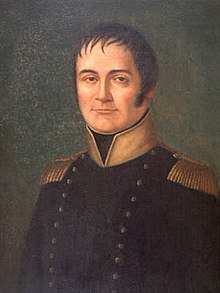Jacques Villeré
Jacques Philippe Villeré (born April 28, 1761 in St. John the Baptist Parish , Louisiana (colony) ; † March 7, 1830 in St. Bernard Parish , Louisiana ) was an American politician and governor of the state of Louisiana from 1816 to 1820 .
Early years
At the time of his birth, Louisiana (colony) was still owned by the French crown. His father Joseph Roi de Villeré was King Louis XV's naval commissioner . and was killed in a Spanish raid. Jacques was born in France at the expense of the Louis XVI government . educated and trained. He became a member of the French Army and stationed in Santo Domingo in 1776 . In 1778 he was captured by the Spaniards and held for several years. After taking an oath of allegiance to Spain, he was released in 1784. That year he married Jeanne Henriette de Fazende, whose father owned a large plantation about seven miles downstream from New Orleans .
Political rise
In 1803 he was a councilor in New Orleans. After President Thomas Jefferson bought the Louisiana Territory from France, Villeré became a member of the militia in the newly created Orleans Territory , in which he rose to major general. He was also a juror in Orleans Parish and Justice of the Peace in St. Bernard Parish. He was then a member of the Constituent Assembly of Louisiana, which became a state in the United States in 1812.
Villeré applied for the office of governor of the new state in 1812. He hoped for the support of his Creole compatriots. Their votes were divided because Jean d'Estrehan was another Creole candidate. As a result, William Charles Cole Claiborne won the election. During the British-American War , his plantation was destroyed by the British in 1815. Villeré took part as general of the militia in the Battle of New Orleans , which the Americans under General Andrew Jackson won against the British. On July 1, 1816, Villeré was elected as the candidate of the Democratic Republican Party for the new governor of his state.
Louisiana Governor
Villeré took up his new office on December 17, 1816. During his four-year term in office, the so-called black codes (laws to suppress free, non-enslaved blacks) were passed. Anyone who killed their opponent in a duel was threatened with the death penalty by law. The aim was to curb the numerous duels at that time. Immigration to the new state was restricted. At a time when there was tension between the originally Creole population and the immigrant Americans from the north, the governor relied on negotiations between the two ethnic groups. There was an economic boom in Louisiana at that time.
Another résumé
After the end of his tenure, Villeré initially withdrew from politics and devoted himself to his private interests. In 1824 he returned to the political scene again by running again for governor of Louisiana. Similar to 1812, however, he had to share the Creole votes with a competitor, so Henry Johnson won the election. He then retired to his plantation in St. Bernard Parish, where he died in 1830 after a long illness. He had eight children with his wife, Jeanne Henriette.
literature
- Robert Sobel and John Raimo (Eds.): Biographical Directory of the Governors of the United States, 1789–1978. Volume 2, Meckler Books, Westport, 1978. 4 volumes.
Web links
- Jacques Villere in the National Governors Association (English)
- The Governors of Louisiana (English)
- Jacques Villeré in the database of Find a Grave (English)
| personal data | |
|---|---|
| SURNAME | Villeré, Jacques |
| ALTERNATIVE NAMES | Villeré, Jacques Philippe (full name) |
| BRIEF DESCRIPTION | American politician and governor of the state of Louisiana (1816-1820) |
| DATE OF BIRTH | April 28, 1761 |
| PLACE OF BIRTH | St. John the Baptist Parish , Louisiana |
| DATE OF DEATH | March 7, 1830 |
| Place of death | St. Bernard Parish , Louisiana |

